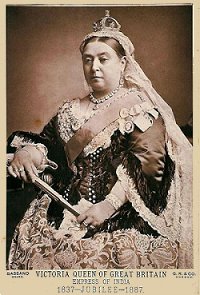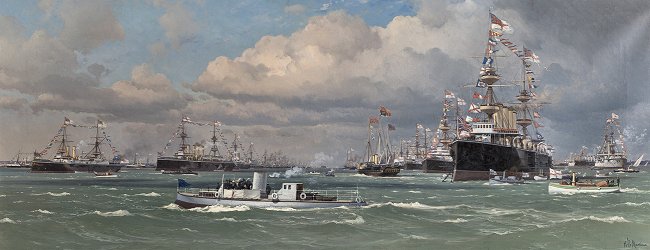| Free Trade in the 19th
Century: The Shortcomings of Britain's New Economic Policy
The nineteenth century was a time
of significant change in Britain's economic policy. In 1846, the repeal
of the Corn Laws marked Britain's abandonment of mercantilism, an economic
theory promoting protectionism, in favour of free trade. Since then, Britain's
shift towards a liberalized trade policy has often been named one of the
reasons behind the Empire's position as economic hegemon between the 1840s
and 1880s. The contemporary proponents of economic liberalism argued that
free trade was the means of guaranteeing prosperity, peace, and civilization.
However, it is doubtful whether its adoption by Britain in 1846 played
a significant role in increasing the Empire's economic power. Instead,
free trade largely fell short of achieving success on a scale predicted
by its contemporary proponents. The economic impact on Britain itself following
the repeal of the Corn Laws was lighter than anticipated, with other factors
proving more critical in determining the level of imports and exports.
Also, in contrast to expectations, Britain remained alone in its pursuit
of trade liberalization, as Europe remained overwhelmingly protectionist
regardless of the British example. Finally, rather than promote peace,
free trade often became a pretext for spreading British influence forcibly.
Both domestically and globally, the effects of free trade differed from
its proponents' initial assumptions.
 |
.... |
Britain's turn towards
free trade resulted from a decades-long debate among the country's economists
and politicians, originated by Adam Smith and his famous The Wealth
of Nations. Richard Cobden personified the pro-free trade faction as
economic liberalism's staunchest supporter. Cobden and his fellow free
traders believed trade liberalization to have wide-ranging benefits for
Britain economically, through lower food prices and the diffusion of the
sterling abroad. It was also predicted to promote prosperity and peace
on a global scale, as other powers were hoped to follow the British example,
eventually rendering war obsolete by their network of commercial ties.
Lastly, free trade, believed to be a progressive and enlightened concept,
was intended to be a means of bringing civilization to the world's more
backward regions. The British combined commercial interests with a moral
mission, thus setting ambitious goals for the new trade policy. |
The breakthrough in Britain's shift
towards free trade, as well as the first test of the policy's success,
came with the abolition of the Corn Laws in 1846. The protectionist laws
had been established in 1815 to shield British farmers from the competition
of other European countries recovering from the Napoleonic Wars. By 1846,
the Anti-Corn Law League led by Cobden claimed protection to be no longer
viable, as it drove domestic prices of food up. Their abolition of the
Laws was hoped to lower food prices and stimulate domestic demand for manufactured
products. However, while grain imports did increase following the repeal,
wheat prices did not significantly drop, while prices of other grains rose.
The disappointing result can be attributed to other factors, which proved
to have more influence over trade than the absence of tariffs. For example,
the population size or transportation costs all affected grain prices in
Britain's leading supplier countries – Prussia, Russia, and the Baltic
States – causing them to remain high. In addition, the years following
the abolition of the Corn Laws saw a deterioration of the continent's agriculture,
leading to a general decrease in the grain supply and thus higher prices.
Naturally, without the arrival of inexpensive food products, it was impossible
for the expected rise in domestic demand to occur and stimulate the manufacturing
sector. Overall, the slight effect of free trade treaties on British imports
indicates that trade liberalization alone was not a sufficient factor to
significantly alter domestic prices.
A similarly insignificant result
of the Corn Laws' repeal can be observed in the export sector. The repeal
and shift to free trade were hoped to boost British exports by providing
exporter countries with the currency needed to buy British manufactured
goods. Yet, until the 1870s, British exports to Prussia and Russia, its
main sources of imports, did not change. Once more, factors other than
trade barriers proved more influential. In the case of Russia, free trade
was an insufficient spur to increase demand for British manufactured goods,
as the country's poverty was too great to be overcome by the absence of
tariffs alone. Similarly, the famous Cobden-Chevalier Treaty of 1860 declaring
free trade between Britain and France did not lead to a permanent rise
in British sales. While the agreement did provide a temporary upsurge of
exports, the boost in the flow of British goods to France eased out within
three years from the signing of the treaty and remained at around 4% of
total British exports until the 1870s. As in the case of imports, free
trade alone was not enough to initiate a change in the established trading
patterns. Transportation, manufacturing technology, and Britain's already
well-established position as a distributor of goods across Europe played
a far more significant role in boosting British exports.
Aside from domestic considerations
behind the decision to pursue free trade, the new policy was also intended
to affect Europe as a whole. The British free-traders believed that Europe
ought to follow the British example of economic liberalism, and create
a web of commercial relations. However, European powers failed to follow
in Britain's footsteps closely enough to realize the expectations. Throughout
the period of Britain's free trade policy, Europe remained mostly locked
behind a barrier of tariffs. Between 1846 and 1860, Britain's policy of
unilateral free trade elicited little response from other European countries.
Only after the signing of the Cobden-Chevalier Treaty between Britain and
France did a flurry of bilateral free trade agreements erupt throughout
Western Europe. Nonetheless, the trend was incomplete as Austria and the
German states involved in their own customs union, the Zollverein, remained
unconvinced. Similarly, Russia was unwilling to abolish its tariffs and
instead formed its own “Zollverein” with Poland. While the British pursuit
of free trade did result in European trade liberalization to a certain
extent in the 1860s, it by no means resulted in a mass movement to free
trade. Tariffs were reduced, but not removed. Also, the effects of the
British example were only temporary, as the majority of the bilateral treaties
signed in the 1860s expired in the 1870s and were not pursued further.
In consequence, the predictions of a domino effect movement towards free
trade were not fulfilled, and all that was accomplished was a series of
temporary reductions in tariffs among only some European countries.

Britain's aim to expand the free
trade doctrine was not limited to Europe. An important aspect of the benefits
promised by the new policy was the perspective of expanding Britain's economic
influence while civilizing other nations through the spread of liberal
ideas. In reality, free trade quickly became an empty slogan used as a
justification for British expansion carried out through coercion. Throughout
the nineteenth century, Britain successfully opened up regions in Latin
America, Africa, and Asia to international commerce through free trade
treaties. However, frequently permanent British presence was required for
the treaty to be fully observed. The annexation of Lagos in 1861 was carried
out precisely for that purpose. Equally often, nations refused to enter
into commercial relations with the British, causing the Empire to revert
to force. China, a prime example of British coercion, was opened to free
trade in the 1840s under the threat of British gunboats. Lord Palmerston,
the British prime minister during the height of free trade policy, considered
the use of force as necessary when dealing with less developed countries.
He was also well aware of the moral justification of free trade being perfect
for garnering the British public's support for international interventions.
Thus, in the hands of politicians, Cobden's idealistic free trade policy
gradually became a tool of imperial expansion.
Once a free trade treaty was signed
and entrance into a region granted, free trade itself became a secondary
matter. Investment was truly the factor that increased British influence
over a territory, as the British invested in foreign ventures which promised
to aid their trade in the region. Technology and infrastructure were the
primary destinations for British funds, with about 40 per cent of total
investment landing in foreign railways alone. In addition, similar proportions
of the world's shipping and telegraph belonged to representatives of the
British Empire. In Latin America, one of the most thoroughly infiltrated
spheres of British influence, the British controlled not only railways,
but also oil industries, and Peru's guano deposits. Control over the world's
assets allowed Britain to stay technologically ahead of its rivals, provided
a safe location for the deposit of British surplus wealth, and became crucial
in the facilitation of international trade. Evidently, free trade was but
a small contribution to the spread of the Empire's economic power and influence.
Regardless of its actual success,
the doctrine of free trade became nineteenth century Britain's trademark.
Since the repeal of the Corn Laws in 1846, British economists and politicians
propagated the virtues of free trade across Europe and the world. Yet,
despite Britain's commitment to trade liberalization for the rest of the
century and beyond, free trade failed to satisfy the full scope of the
its proponents' hopes. The impact of free trade treaties on imports and
exports as demonstrated by the repeal of the Corn Laws and the signing
of the Cobden-Chevalier Treaty was not staggering. In fact, it suggested
that free trade on its own was insufficient to sustain and increase the
country's economic supremacy. Likewise, the dream of drawing other European
powers into a web of free trade treaties did not materialize. The majority
of Europe maintained its tariffs, and the only period of relative trade
liberalization in the 1860s was short-lived. In terms of expanding the
Empire's influence abroad, free trade proved less instrumental than foreign
investment, as its role was often constrained to providing a pretext for
the forceful opening up of foreign territories to international commerce.
On all fronts, the results of free trade were different from what Richard
Cobden and his colleagues prophesied. Thus, free trade can be more accurately
considered as a symbol of the British Empire's might, than as its cause.
Laura Polcyn

Laura Polcyn - studentka trzeciego
roku historii i ekonomii na Lakehead University w Thunder Bay (Ontario).
|